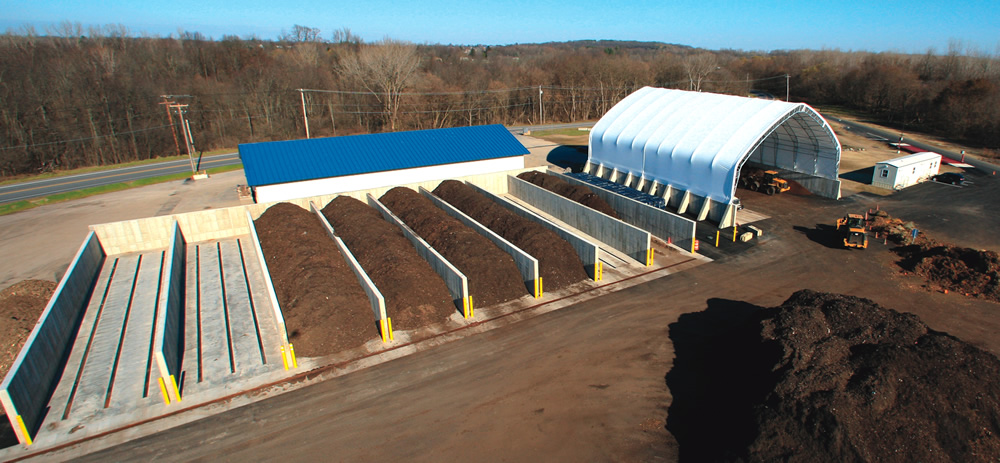Climate change is a global issue that has been affecting the world for decades. One of the major contributors to this problem is the emission of greenhouse gases. These gases are released into the atmosphere from various sources, including agriculture, transportation, and industries. However, there is a lesser-known contributor to greenhouse gas emissions, and that is organic waste. Organic waste, such as food scraps and yard trimmings, produce methane gas when it decomposes in landfills. This is where composting comes in. Composting is a natural process that converts organic waste into a nutrient-rich soil amendment.
Commercial Composting: The Natural Solution to Reducing Greenhouse Gas Emissions
Commercial composting is a natural process that involves breaking down organic materials into nutrient-rich soil. This process has proven to be an effective solution in reducing greenhouse gas emissions and mitigating climate change.
The decomposition of organic waste in landfills is a significant contributor to greenhouse gas emissions. When organic waste decomposes in the absence of oxygen, it produces methane, a potent greenhouse gas that is 25 times more potent than carbon dioxide. By diverting organic waste from landfills and composting it instead, we can significantly reduce the amount of methane released into the atmosphere.
Composting also helps to sequester carbon from the atmosphere. When organic materials break down, they release carbon dioxide. However, if these materials are composted instead of being sent to a landfill, the carbon is stored in the resulting soil. This means that composting can help to reduce the amount of carbon in the atmosphere, which is important for mitigating climate change.
Reducing Your Carbon Footprint with Composting
Composting is an effective way to reduce your carbon footprint and contribute to mitigating the effects of climate change. The process of composting involves the decomposition of organic waste, such as food scraps and yard waste, into a nutrient-rich soil amendment that can be used to improve soil health and plant growth.
One of the key benefits of composting is that it diverts organic waste from landfills, where it would otherwise decompose anaerobically and release methane, a potent greenhouse gas. By composting, you can reduce the amount of methane that is generated and released into the atmosphere, thereby reducing your carbon footprint. Additionally, composting reduces the need for synthetic fertilizers, which are energy-intensive to produce and can contribute to greenhouse gas emissions.
Composting also helps to conserve water by improving soil structure and increasing its ability to retain moisture. This can be particularly beneficial in areas with dry or arid climates, where water resources are limited.
Composting is a simple and accessible practice that can be done in a variety of settings, from backyard gardens to large-scale facilities. To get started, all you need is a compost bin or pile, organic waste materials, and a little bit of patience. With time, you’ll be able to produce a valuable soil amendment that can benefit your plants and the environment.
How Composting Can Help Fight Climate Change
Composting is a natural process that involves the decomposition of organic waste materials, such as food scraps, yard waste, and paper products. This process can help reduce greenhouse gas emissions and fight climate change in a number of ways.
Firstly, composting helps to divert organic waste from landfills. When organic waste is sent to landfills, it decomposes anaerobically, which means that it breaks down without oxygen. This process releases methane, a potent greenhouse gas that is 25 times more harmful than carbon dioxide. By composting organic waste instead, we can reduce the amount of methane that is released into the atmosphere.
Secondly, composting can help to improve soil health and reduce the need for synthetic fertilizers. Compost adds valuable nutrients to soil, such as nitrogen, phosphorus, and potassium, which are essential for plant growth. When these nutrients are added to soil through composting, it can help to reduce the need for synthetic fertilizers that are often made using fossil fuels.
Finally, composting can help to conserve water. When compost is added to soil, it can improve the soil’s ability to retain moisture. This means that less water is needed to keep plants healthy and hydrated. In areas where water is scarce, composting can be especially valuable in helping to conserve this precious resource.
Sustainable Solution to Combat Climate Change
Composting is a natural process where organic waste is decomposed into nutrient-rich soil. It is a sustainable solution to combat climate change, as it reduces the amount of organic waste that ends up in landfills. Organic waste in landfills contributes to the release of greenhouse gases, particularly methane, which is a potent contributor to climate change.
Through composting, organic waste is diverted from landfills and instead, is turned into a valuable resource. Composting not only reduces the amount of methane released into the atmosphere, but it also helps to mitigate carbon emissions.
The Link Between Composting and Reducing Methane Emissions
Composting is the process of breaking down organic waste into a nutrient-rich soil amendment. This process plays a critical role in reducing greenhouse gas emissions, particularly methane, which is a potent greenhouse gas that is 28 times more potent than carbon dioxide.
Organic waste, such as food scraps and yard waste, that ends up in landfills produces methane gas as it decomposes. Methane is produced when organic materials are broken down in an oxygen-deprived environment, such as a landfill. This methane gas is then released into the atmosphere, contributing to global warming and climate change.


